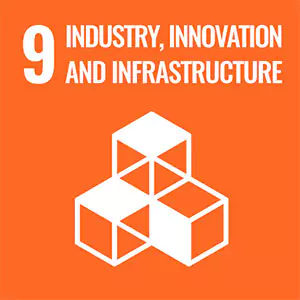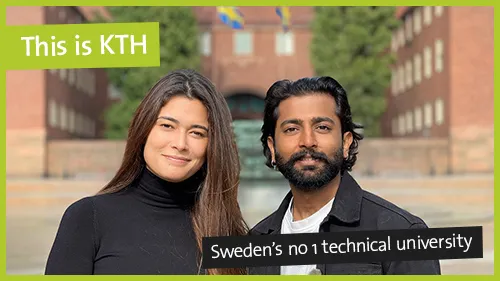MSc Polymer Technology
The joint Nordic Five Tech master's programme in Polymer Technology equips students with comprehensive tools needed to develop future materials in, for example, advanced health care, energy production, green packaging, bio-based composites and surface coatings. Students study at two Nordic universities and graduate with two degrees. The programme takes full advantage of both universities' strengths and research specialisations.
Study at two Nordic universities
The joint master’s programme in Polymer Technology is a result of the collaboration between the five leading technical universities in the Nordic countries (Nordic Five Tech). The programme gives you a unique opportunity to tailor your degree based on your academic interests. You will get to study at KTH Royal Institute of Technology, Sweden, and the Technical University of Denmark , spending one year at each. You graduate with a master’s degree from each of the two universities. Nordic Five Tech is a strategic alliance consisting of:
- Aalto University in Finland
- Chalmers University of Technology in Sweden
- Technical University of Denmark
- KTH Royal Institute of Technology in Sweden
- Norwegian University of Science and Technology
Polymer Technology
The programme provides a solid base in the chemistry and physics of organic materials and their connection to real-life applications. A broad range of courses and the choice of one of two specialisation tracks allow students to customise their degree and focus on individual areas of particular interest.
Students will learn about the design, synthesis, characterisation, production and development of polymeric materials throughout the programme. The materials covered in the programme include plastics, rubber, composites, paper, wood and other biological materials. Students will be able to tackle challenges pertaining to the choice of raw materials (renewable versus fossil), and the choice of production processes, material combinations and manufacturing methods. Great emphasis is placed on environmental issues, such as environmentally-friendly material production and the development of sustainable materials.
This is a two-year programme (120 ECTS credits) given in English. The first year covers a broad range of topics providing students with in-depth knowledge of the fundamentals of polymer technology and related areas. The curriculum also contains selective courses to prepare students for the second-year study track. Each university provides one specialisation track designed to deepen the students' knowledge in a specific area. The currently offered tracks are:
- Polymer engineering (Technical University of Denmark)
- Macromolecular materials (KTH Royal Institute of Technology)
In your application to the programme, you must include a summary sheet in which you indicate your study track and specify which university you will attend in year 1 and year 2.
Study tracks and mobility
The courses in the programme cover topics such as polymer synthesis, polymer physics, fibre technology, pulp and paper technology, biomedical materials and materials for sustainable applications.
Study track and mobility for the master's programme in Polymer Technology
Degree project
The degree project is carried out in the last term of the second year of the programme. The degree project is, thus, undertaken at the second-year university in a research group or as a project in industry. The thesis is to be a synthesis of the knowledge and competencies gained in the three preceding terms. The thesis is supervised jointly with faculty from the student's first- and second-year university. The results are presented as a written report and according to the rules at the first and second-year universities.
Degree projects that have previously been undertaken cover topics such as the design of bio-based replacements for commodity plastics or adhesives, scaffold fabrication for regenerative medicine applications, evaluation of the long-term properties of plastics, understanding fibre swelling and evaluation of the effect of fibre treatments on, for example, antibacterial properties.
Degree
Graduates from the programme receive two degrees, one from each university. The two diplomas will be supplemented with an insert describing the consortium and the programme. The titles on the diplomas will be:
- Technical University of Denmark: Master of Science in Engineering (120 credits)
- KTH Royal Institute of Technology: Master of Science (120 Credits)
Students
Find out what students from the programme think about their studies and life in the cities of the universities they attended.

Future and career
Career opportunities for students from this programme are broad and international. Advanced skills in both fibre and polymer technology combined with a clear environmental focus provide an excellent basis for various careers in industry, government agencies and academia and graduates from the master programme are very attractive for many different industries such as the paper and forest industry, plastics, medical technology, pharmaceutical, coating and adhesive and packaging industry. Material expertise is also needed in many other sectors, ranging from transport to electronics. After graduation you can expect to take on roles such project leader for development and production, research and development engineer, quality assurance engineer, consultant, project manager, product specialist and process engineers.
The need for graduates with the competence offered by the programme will continue to be excellent and are projected to increase in the future.

Sustainable development
Graduates have the knowledge and tools for moving society in a more sustainable direction, as sustainable development is an integral part of all programmes. The three key sustainable development goals addressed by the master's programme in Polymer Technology are:



Students in the programme learn how to research, design, and produce environmentally friendly materials that will replace many synthetic materials currently found in society. As such, contributing to a toxin-free society will improve the health and well-being of humanity.
Students in the programme learn how to build resilient materials for use in infrastructure (for example, composites, thermoplastics and formulated products). Students also learn how to promote inclusive and sustainable industrialisation by developing environmentally friendly materials that promote innovations in industrial material development.
A study in polymer technology naturally involves the responsible use of materials and sustainable production. In particular, this relates to the development of new materials with superior properties, leading to lower consumption of materials, a longer lifetime and considerations of end-of-life scenarios for materials.
Faculty and research
All member universities of the Nordic Five Tech alliance are prominent in the field of Chemical Engineering ranking high on global university ranking lists. Both KTH and DTU rank top 20 of universities within Chemical Engineering in Europe (QS World University Rankings by Subject 2023).
Faculty and research at KTH
The research at the School of Engineering Sciences in Chemistry, Biotechnology and Health at KTH spans over a wide range of topics, for example, the development of solar and fuel cells as well as other environmentally friendly energy sources, how to store nuclear waste safely, the design of novel polymers for use in the medical industry, the use of natural materials in new products and how friction can be explained on a molecular level.
The Department of Fibre and Polymer Technology conducts research at the frontiers of macromolecular material science of biopolymers, bio-based polymers and synthetic polymers. The research ranges from monomer and polymer syntheses and characterization to modelling/simulation, processing, long-term properties and material performance, composites, functionalities and devices and studies of pulp and paper. Research areas that have been identified as strategically important are materials from renewable resources, nanostructured materials, materials for medical applications and materials for the field of energy. These are closely related to the Sustainable Development Goals, ensuring relevance for our society today and in the future.
Research stories from KTH
- Repairing Bone Fractures Using High‐Performance Thiol-Ene Adhesive
- Engineering 3D printed and knitted degradable scaffolds
2MiLab
2MILab (Molecules and Materials at Interfaces Laboratory) has the aim of obtaining an understanding at a molecular scale and performing chemical engineering at interfaces in order to be able to control materials properties. 2MILab will stimulate interdisciplinary research projects and involve a large number of cutting-edge research techniques.
Greenhouse Labs
Greenhouse Labs is a space hosted at KTH where small companies that work for a sustainable future can conduct research. Around ten companies are now housed in Greenhouse Labs, and their research spans a wide range of chemical areas, from molecular solar cells to drug development.
Faculty and research at Technical University of Denmark
The Department of Chemical and Biochemical Engineering at the Technical University of Denmark covers the core chemical engineering disciplines: separation processes, reaction engineering, dynamics and process control, process design, product design, unit operations, transport phenomena and engineering thermodynamics. In addition, the department teaches and performs research within areas of particular practical importance, for example: polymer materials, coatings science and technology, and heterogeneous catalysis and bio-catalysis. Polymer research and teaching takes place at several departments across the university and exploits state-of-the-art research facilities, such as the Centre for Electron Nanoscopy CEN-DTU.
Polymer-related research and teaching activities cover broadly the field of materials science. This includes activities in the synthesis of polymers, characterization, analysis, formulation, and processing of elastomers, coatings, composite science as well as modeling and flow simulation. More specifically, research is currently focused on bio-based polymers, controlled polymerization techniques, and applied research in silicone elastomers as well as complex fluids and extensional rheology. Student projects are typically either part of ongoing research projects or are conducted in close collaboration with industry.

